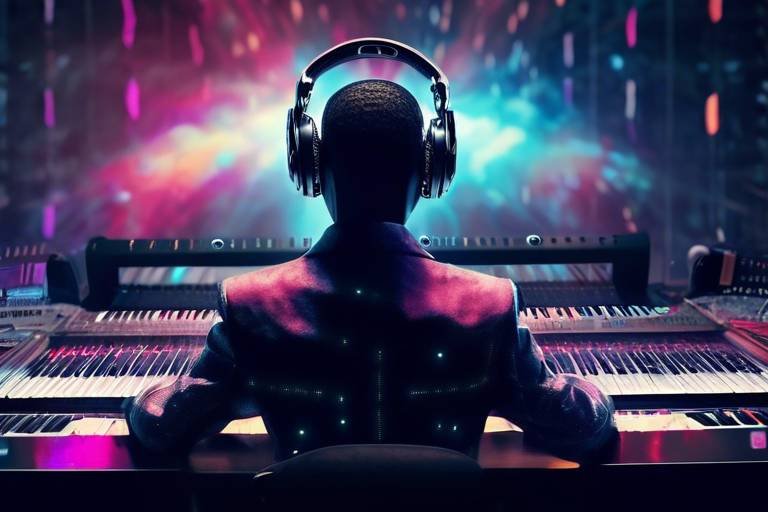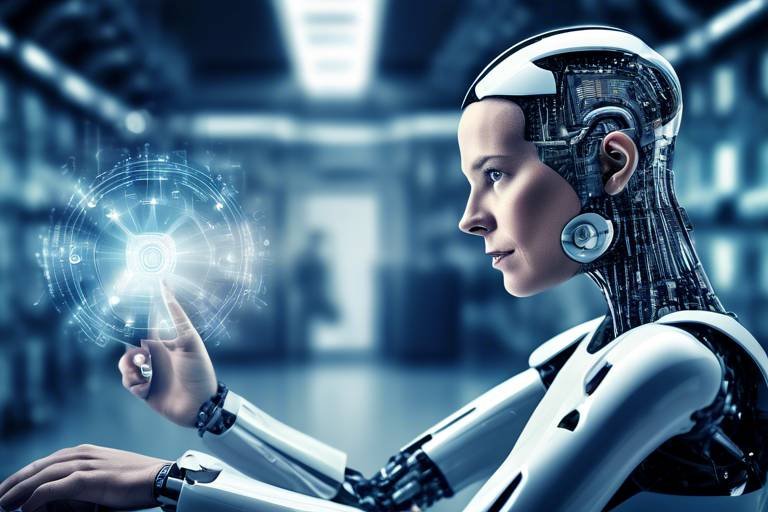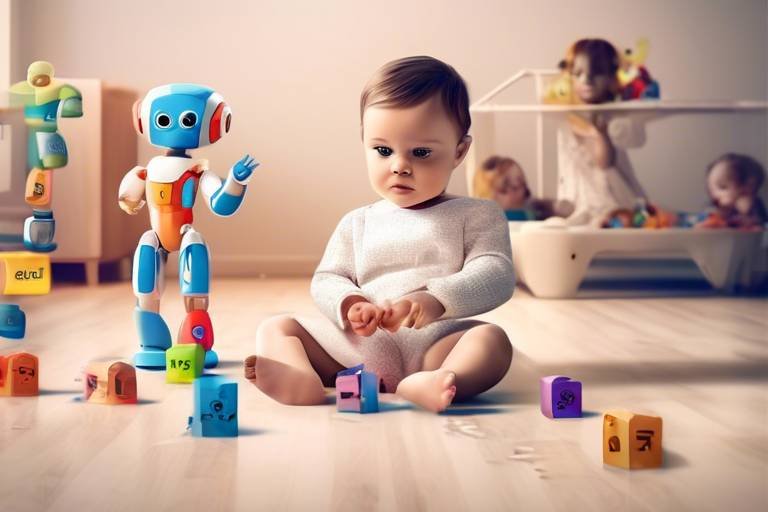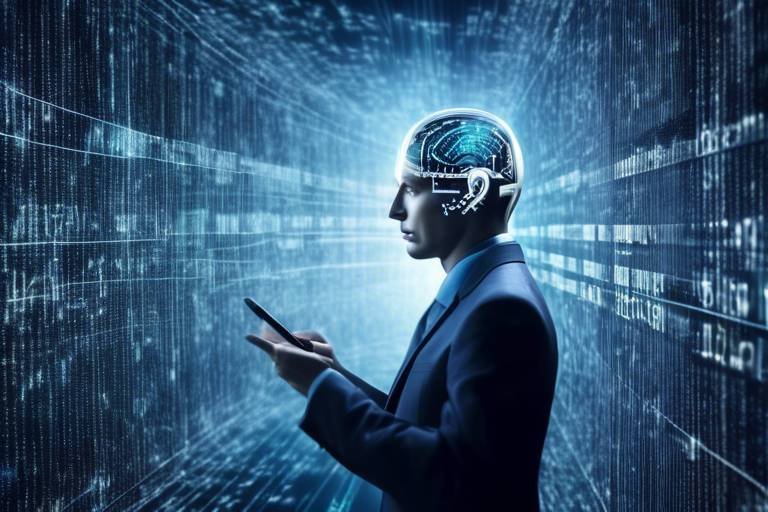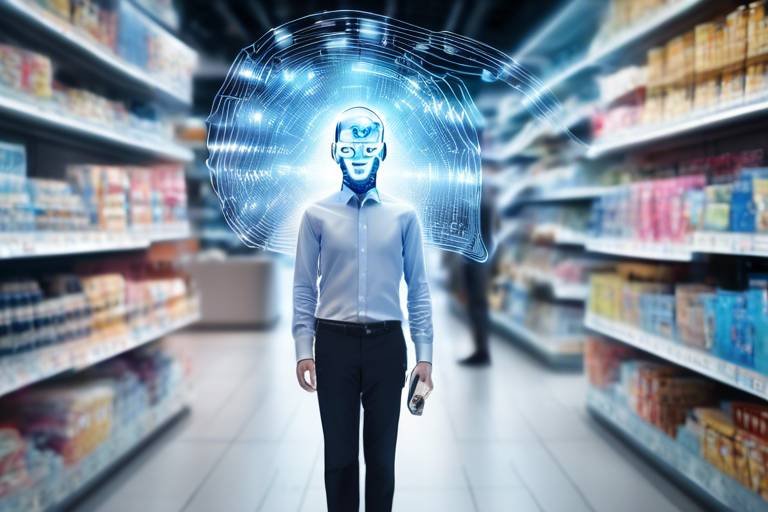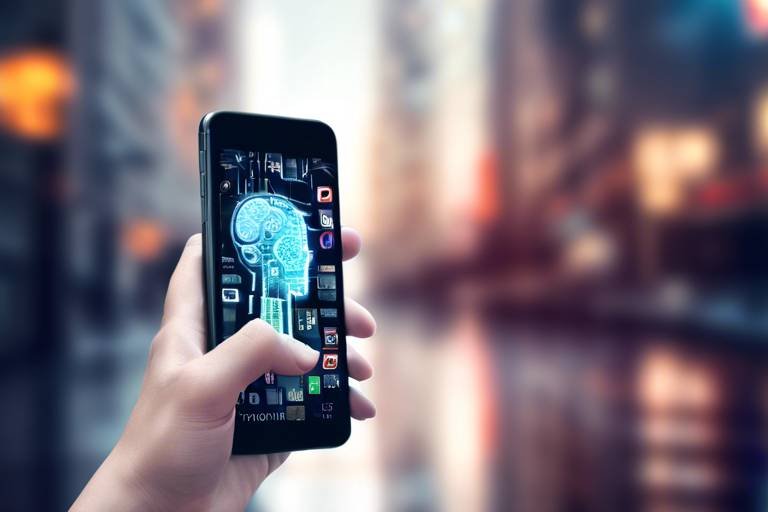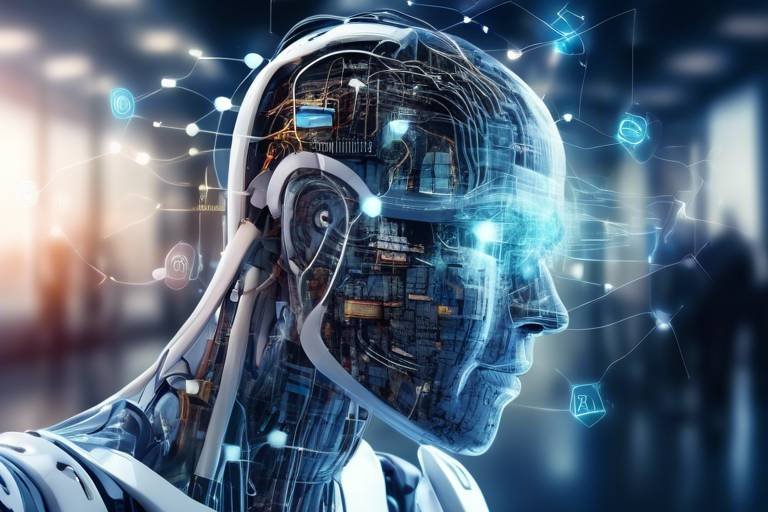How AI is Transforming the Music Business
The music industry is undergoing a remarkable transformation, thanks to the advent of artificial intelligence (AI). It's as if a new era of creativity and efficiency has dawned, where machines and humans collaborate to create melodies that resonate with audiences worldwide. Imagine a world where algorithms not only assist in crafting songs but also understand the intricate tastes of listeners, tailoring experiences that were once thought to be purely human. This article delves into the profound impact of AI on the music industry, highlighting innovations in music creation, distribution, marketing, and consumption that are reshaping the landscape for artists and listeners alike.
Artificial intelligence is revolutionizing music composition, enabling artists to collaborate with algorithms that generate melodies, harmonies, and lyrics, thus expanding creative possibilities and pushing the boundaries of traditional songwriting. For instance, AI tools like OpenAI's MuseNet and Google's Magenta are capable of analyzing vast datasets of existing music to produce original compositions that can inspire human musicians. This symbiotic relationship between human creativity and machine learning is akin to having a co-writer who never runs out of ideas, allowing artists to explore uncharted musical territories.
Streaming platforms are leveraging AI to analyze user preferences and listening habits, providing personalized music recommendations that enhance user experience and help listeners discover new artists and genres tailored to their tastes. Have you ever wondered how Spotify knows exactly what you want to listen to next? It's all thanks to sophisticated algorithms that track your listening history and compare it with millions of other users. This creates a feedback loop that not only keeps you engaged but also helps emerging artists gain visibility in an overcrowded market.
AI tools analyze vast amounts of data to identify emerging trends in music, allowing artists and labels to make informed decisions about marketing strategies and the types of music to produce. By examining factors like streaming statistics, social media interactions, and even geographical preferences, AI can pinpoint what’s hot and what’s not. This is especially crucial in an industry where tastes can shift overnight. For example, a sudden surge in popularity for a particular genre can prompt record labels to pivot their marketing strategies, ensuring they stay ahead of the curve.
Machine learning algorithms can predict which songs are likely to become hits based on historical data, enabling record labels to invest in promising tracks and artists more strategically. This predictive capability is akin to having a crystal ball that reveals the next big thing in music. By analyzing patterns in previous chart successes, AI can help labels make data-driven decisions that minimize risk and maximize potential returns.
AI analyzes social media interactions and streaming statistics to provide insights into audience preferences, helping artists refine their styles and marketing approaches to better connect with fans. This understanding of audience behavior is invaluable; it’s like having a backstage pass to the minds of listeners. Artists can tailor their music and promotions to resonate more deeply with their audience, fostering a stronger connection and loyalty.
AI technologies are streamlining the music production process by automating tasks such as mixing and mastering, allowing producers to focus on creativity while improving efficiency and reducing costs. Imagine spending less time on tedious technical details and more time crafting the perfect sound. AI-driven tools can analyze tracks in real-time, suggesting adjustments that enhance audio quality without the need for extensive manual input. This not only speeds up the production process but also democratizes music creation, enabling more artists to produce high-quality music from their home studios.
Artificial intelligence is transforming music marketing strategies, enabling targeted advertising campaigns that reach specific demographics, ultimately increasing engagement and driving sales for artists and labels. By leveraging data analytics, artists can now create marketing campaigns that are not just broad strokes but finely tuned instruments aimed at their core audience. This precision in targeting is a game-changer in an industry where every dollar spent on advertising counts.
AI tools assess social media performance, helping artists understand which content resonates with their audience, thus optimizing their promotional strategies and enhancing their online presence. With platforms like Instagram, Twitter, and TikTok playing pivotal roles in artist promotion, understanding what works and what doesn’t is crucial. AI can sift through engagement metrics, providing actionable insights that enable artists to create content that captivates their followers.
AI identifies potential influencers for collaboration, allowing artists to strategically partner with individuals who can amplify their reach and connect them with new audiences effectively. In the age of social media, influencer marketing has become a vital tool for musicians. By using AI to analyze follower demographics and engagement rates, artists can find the perfect influencers to collaborate with, ensuring that their music reaches the right ears.
- How does AI impact music creation? AI assists artists by generating melodies, harmonies, and lyrics, expanding creative possibilities.
- Can AI predict which songs will be hits? Yes, AI analyzes historical data to forecast potential chart success.
- How does AI enhance music marketing? AI enables targeted advertising and provides insights into audience preferences, optimizing marketing strategies.

AI in Music Creation
Artificial intelligence is revolutionizing the way music is composed, offering a fresh canvas for artists to explore. Imagine having a digital partner that not only understands your musical style but can also suggest new melodies or harmonies that you might never have thought of. This is exactly what AI brings to the table. By utilizing sophisticated algorithms, AI can analyze existing songs, dissect their components, and generate new compositions that resonate with listeners. It’s like having an infinite well of creativity at your fingertips, pushing the boundaries of traditional songwriting.
One of the most exciting aspects of AI in music creation is its ability to facilitate collaboration between humans and machines. Artists can input their ideas into AI systems, which can then generate various musical elements—be it a catchy hook, a complex chord progression, or even the lyrics for a song. This collaboration expands the creative possibilities, allowing musicians to experiment with different styles and genres without the constraints of conventional songwriting methods. In a way, AI acts as a muse, sparking inspiration and innovation.
Furthermore, AI-driven tools can analyze vast libraries of music to identify patterns and trends. This means that artists can create music that not only reflects their unique voice but also aligns with current listener preferences. For instance, if an artist is known for their upbeat tracks, AI can suggest elements from trending songs that might enhance their sound, helping them stay relevant in a fast-paced industry. It's like having a personal advisor who knows exactly what the audience is craving.
To illustrate how AI influences the music creation process, consider the following table that highlights some popular AI music generation tools:
| Tool Name | Functionality | Notable Features |
|---|---|---|
| AIVA | Composes music for various genres | Customizable styles, emotional settings |
| Amper Music | Generates royalty-free music | User-friendly interface, quick creation |
| OpenAI's MuseNet | Creates complex compositions | Multi-genre support, collaborative features |
With AI's involvement in music creation, the industry is witnessing a paradigm shift. Artists no longer have to rely solely on their skills or inspiration; they can harness the power of technology to enhance their creative process. This integration of AI is not just a trend; it's a significant evolution that is reshaping the music landscape, making it more accessible and diverse. As we move forward, the question remains: how will artists continue to adapt to this new era of musical innovation?
- How does AI help in music creation? AI assists artists by generating melodies, harmonies, and even lyrics, allowing for greater creativity and collaboration.
- Are AI-generated songs considered real music? Yes, AI-generated music is considered real music, as it can evoke emotions and connect with listeners just like human-created music.
- Can AI replace human musicians? While AI can enhance the creative process, it is unlikely to replace human musicians entirely, as the emotional depth and personal experiences they bring are irreplaceable.

AI-Driven Music Recommendations
In today's fast-paced digital landscape, discovering new music can feel like searching for a needle in a haystack. With millions of tracks available at our fingertips, how do we find the songs that truly resonate with us? This is where artificial intelligence steps in, transforming the way we explore music. Streaming platforms like Spotify, Apple Music, and YouTube Music utilize sophisticated AI algorithms to analyze user preferences and listening habits. This technology doesn't just throw random songs at you; it curates a personalized listening experience that feels almost tailored to your soul.
Imagine walking into a record store where a friendly clerk knows your taste better than you do. That's the power of AI-driven recommendations! These algorithms sift through vast amounts of data—including your past listening history, the artists you follow, and even the time you spend on specific tracks—to create a unique music profile just for you. The result? A playlist that feels like a soundtrack to your life, introducing you to new artists and genres that you might not have discovered otherwise.
One fascinating aspect of AI recommendations is their ability to adapt over time. Just like your musical tastes evolve, so does the technology that predicts them. The more you listen, the better the recommendations become. This creates a feedback loop of discovery, where each new song you enjoy helps refine the algorithm, leading to even more accurate suggestions. It's almost like having a music genie that learns your preferences and surprises you with delightful finds!
But how exactly does this work? Let's break it down:
- Data Collection: AI gathers data from various sources, including your listening habits, playlists, and even social media interactions.
- Pattern Recognition: Advanced algorithms identify patterns and correlations in the data, determining what types of music you gravitate towards.
- Recommendation Generation: Based on the insights gained, the AI generates playlists or song suggestions that align with your established preferences.
Moreover, these AI-driven systems aren't just beneficial for listeners. They also empower artists by helping them reach their target audience more effectively. When a new artist releases a song, AI can analyze which listeners are most likely to enjoy it based on their previous interactions. This means that emerging talents can find themselves in front of the right ears, significantly increasing their chances of success in a crowded industry.
As we continue to embrace the digital age, the importance of AI in music recommendations will only grow. It's not just about convenience; it's about creating a dynamic and engaging music experience that keeps listeners coming back for more. So, the next time you find yourself captivated by a new track, take a moment to appreciate the intricate technology that made that discovery possible.
Q: How does AI know what music I like?
A: AI analyzes your listening habits, including the songs you play, skip, and save, to build a profile of your musical preferences.
Q: Can AI recommend songs from new artists?
A: Absolutely! AI-driven platforms are designed to introduce you to new artists that align with your tastes, helping you discover fresh sounds.
Q: Will my recommendations change over time?
A: Yes! As you listen to more music, the AI algorithms adapt and refine your recommendations to better suit your evolving tastes.
Q: Are AI recommendations accurate?
A: While AI recommendations are generally quite accurate, they can vary based on the data available and your listening habits. The more you engage with the platform, the better the suggestions will become.

Data Analysis for Trends
In the fast-paced world of music, staying ahead of the curve is crucial for artists and record labels alike. This is where AI-powered data analysis steps in, acting like a crystal ball that reveals the hidden patterns and trends within the vast ocean of musical data. Imagine a detective sifting through clues to solve a mystery—AI does just that, analyzing everything from streaming numbers to social media interactions. By examining these data points, AI can identify what genres are gaining traction, which artists are on the rise, and even the types of lyrics that resonate with listeners at any given moment.
For instance, AI tools can process millions of playlists and listening habits to uncover emerging trends. This means that an artist might find out that a particular sound or theme is becoming popular even before it hits mainstream channels. With this knowledge, they can tailor their next project to align with these trends, ensuring that they remain relevant and appealing to their audience. It’s like having a backstage pass to the future of music!
Moreover, the insights gained from AI analysis are not just beneficial for artists; they also serve record labels and marketers. By understanding what listeners are gravitating towards, labels can make informed decisions about which artists to promote and what type of music to produce. This data-driven approach minimizes the risk of investing in projects that may not resonate with audiences.
To illustrate the impact of data analysis in the music industry, consider the following table that highlights key areas where AI contributes to trend analysis:
| Data Source | Insights Gained | Impact on Music Strategy |
|---|---|---|
| Streaming Platforms | Popular genres, artist performance | Informed marketing and production decisions |
| Social Media | Audience engagement, trending topics | Refined promotional strategies, content creation |
| Music Charts | Historical performance data | Predictive analytics for hit potential |
In conclusion, the integration of AI in data analysis is a game changer for the music industry. It not only helps artists and labels stay ahead of trends but also enhances the overall experience for listeners. By leveraging these insights, musicians can create more relevant and impactful music while engaging with their audience in meaningful ways. So, the next time you hear a catchy tune, remember that behind its creation may lie a wealth of data-driven insights that shaped its very existence!

Predicting Chart Success
In the ever-evolving music landscape, predicting which songs will climb the charts has become a science of its own. Thanks to the power of machine learning algorithms, record labels and artists can now analyze historical data to forecast potential hits. Imagine having a crystal ball that reveals which tracks are destined for greatness! This innovative approach not only empowers labels to make informed investment decisions but also helps artists focus their efforts on the songs that are more likely to resonate with audiences.
So, how does this work? The algorithms sift through countless data points, including streaming numbers, social media buzz, and even the characteristics of previous chart-topping tracks. For example, they might analyze elements like tempo, key, and lyrical themes. By recognizing patterns and correlations, AI can predict which new releases have the potential to capture listeners' hearts and ears.
Moreover, the impact of these predictions is profound. Artists can tailor their promotional strategies based on insights gained from AI analytics. If a song is predicted to be a hit, artists may choose to invest more in its marketing, perhaps by creating engaging music videos or launching targeted social media campaigns. On the flip side, if a track doesn’t show promise, they can pivot quickly, saving both time and resources.
Here’s a quick look at some of the factors that AI considers when predicting chart success:
| Factor | Description |
|---|---|
| Streaming Data | Analyzes how often a song is streamed across various platforms. |
| Social Media Engagement | Tracks likes, shares, and comments related to the song or artist. |
| Historical Trends | Looks at the success of similar tracks from the past. |
| Genre Popularity | Assesses current trends in music genres to predict potential success. |
As AI continues to evolve, its ability to predict chart success will only become more sophisticated. This means that artists and labels who embrace these technologies are likely to stay ahead of the curve, adapting quickly to the ever-changing tastes of music lovers. In a world where a single song can go viral overnight, having the right insights can make all the difference between a fleeting moment of fame and a lasting career.
- How does AI predict song success? AI analyzes historical data, streaming patterns, and social media engagement to identify potential hits.
- Can artists influence AI predictions? Yes, artists can adjust their marketing strategies based on AI insights to maximize their chances of success.
- Is AI replacing human creativity in music? No, AI is a tool that enhances creativity by providing insights, but the artistic vision remains human-driven.
- What are some popular AI tools used in the music industry? Tools like IBM Watson and Amper Music are examples of AI technologies being utilized in music creation and analysis.

Understanding Audience Preferences
In the ever-evolving landscape of the music industry, understanding audience preferences has become a crucial element for artists and record labels alike. With the rise of artificial intelligence, this task has transformed from a guessing game into a precise science. Imagine having a crystal ball that not only shows you what your fans want but also provides insights into trends before they even hit the mainstream. That’s the power of AI!
AI algorithms sift through mountains of data—from streaming statistics to social media interactions—offering a treasure trove of insights. These tools analyze how listeners engage with music, pinpointing which genres are gaining traction, what lyrics resonate, and even the times of day when fans are most active. This allows artists to tailor their music to fit the evolving tastes of their audience.
For instance, let’s say an artist notices a spike in engagement on a specific song. By using AI analytics, they can dive deeper to understand the demographics behind that engagement. Are these listeners primarily teenagers? Do they prefer upbeat tracks or more mellow tunes? This kind of detailed analysis can shape future releases and marketing strategies, ensuring that artists remain relevant and connected to their fans.
Moreover, AI doesn’t just stop at analyzing existing data; it can also predict future trends. By examining historical data, AI can forecast shifts in music preferences, allowing artists to stay ahead of the curve. This predictive capability is like having a backstage pass to the future of music, enabling creators to craft songs that not only appeal to current listeners but also attract new fans.
To illustrate this, consider the following table that summarizes how AI enhances the understanding of audience preferences:
| AI Capability | Description |
|---|---|
| Data Analysis | Analyzes streaming and social media data to identify listener trends. |
| Predictive Analytics | Forecasts future music trends based on historical data. |
| Demographic Insights | Provides detailed demographics of listeners, including age, location, and preferences. |
| Engagement Metrics | Tracks how and when fans engage with music, helping optimize release strategies. |
With these insights, artists can not only refine their sound but also craft marketing campaigns that resonate deeply with their audience. Imagine an artist launching a new album and using AI to determine the best time to drop a single based on when their fans are most active online. This level of strategy can significantly boost engagement and sales, creating a win-win situation for both artists and their listeners.
In conclusion, understanding audience preferences through AI is not just about numbers; it's about forging a deeper connection between artists and fans. By leveraging these insights, musicians can create music that truly speaks to their audience, ensuring their place in the ever-changing music landscape. So, as we move forward, it’s clear that those who embrace AI will not only survive but thrive in the music business.
- How does AI help in understanding audience preferences?
AI analyzes vast amounts of data from streaming platforms and social media to identify trends and preferences among listeners, allowing artists to tailor their music and marketing strategies accordingly.
- Can AI predict future music trends?
Yes, AI uses historical data to forecast shifts in music preferences, helping artists stay ahead of the curve and create music that appeals to both current and future audiences.
- What kind of data does AI analyze?
AI analyzes streaming statistics, social media interactions, listener demographics, and engagement metrics to provide comprehensive insights into audience preferences.

Automated Music Production
In the rapidly evolving landscape of the music industry, is emerging as a game-changer. Imagine a world where artists can focus solely on their creative visions while technology takes care of the nitty-gritty. This is not just a dream; it's happening right now! AI technologies are stepping in to streamline various aspects of music production, making the process more efficient, cost-effective, and accessible than ever before.
Gone are the days when a producer needed to spend countless hours on tedious tasks like mixing and mastering tracks. With the advent of AI, these processes can now be automated, allowing producers to dedicate more time to what truly matters: creativity. For instance, AI-driven software can analyze tracks, identify imperfections, and suggest improvements, effectively acting as a virtual assistant in the studio. This not only enhances the quality of the final product but also speeds up the overall production time.
Furthermore, AI tools can provide real-time feedback during the recording process, helping artists make informed decisions on the fly. Imagine recording a vocal track and having an AI system instantly suggest adjustments to pitch or timing. This kind of technology empowers artists to experiment more freely, knowing they have a safety net that can catch potential errors before they become problematic.
Additionally, the cost-effectiveness of automated production cannot be overlooked. Traditional music production often requires expensive studio time, specialized equipment, and a team of skilled professionals. However, with AI, many of these barriers are reduced. Independent artists and small labels can now produce high-quality music from their home studios, democratizing the music creation process. This shift is particularly significant for emerging artists who may lack the financial resources to access conventional recording studios.
To illustrate the impact of automated music production, consider the following table that showcases some popular AI tools currently used in the industry:
| AI Tool | Function | Benefits |
|---|---|---|
| LANDR | Automated mastering | Quick, affordable mastering with professional quality |
| AIVA | Music composition | Generates original compositions in various styles |
| iZotope Ozone | Mixing and mastering | AI-assisted tools for optimizing sound quality |
| Amper Music | Music creation | Users can create custom music tracks with ease |
As we look to the future, the question arises: will AI replace human producers? While AI can significantly enhance the production process, it is unlikely to fully replace the human touch. The emotional depth and artistic nuances that only a human can bring to music are irreplaceable. Instead, AI will serve as a powerful ally, enabling artists to push their creative boundaries while also streamlining production workflows.
In conclusion, automated music production is not just a trend; it is a significant evolution in how music is created. By embracing AI technologies, artists can enhance their creative processes, reduce costs, and produce high-quality music more efficiently. The future of music is bright, and with AI at the helm, we can expect to see even more innovative sounds and groundbreaking artists emerging on the scene.
- What is automated music production? Automated music production refers to the use of AI technologies to streamline various aspects of the music creation process, such as mixing, mastering, and composition.
- How does AI improve music quality? AI tools analyze tracks and provide suggestions for improvements, ensuring a polished final product while reducing the time spent on manual adjustments.
- Can independent artists benefit from automated production? Absolutely! Automated production tools make high-quality music creation accessible to independent artists who may not have the budget for traditional studio time.
- Will AI replace human producers? While AI can assist in many production tasks, the unique creative touch of human producers remains irreplaceable, making them essential in the music industry.

AI in Music Marketing
Artificial intelligence is transforming music marketing strategies in ways that were previously unimaginable. Imagine a world where every song you hear feels tailor-made just for you. That’s the magic of AI! By analyzing vast amounts of data, AI can identify trends, preferences, and behaviors that help artists and labels craft highly targeted marketing campaigns. This isn’t just about throwing a wide net and hoping for the best; it’s about precision, accuracy, and connecting with fans on a deeper level.
One of the most significant advancements AI brings to the table is the ability to create targeted advertising campaigns. These campaigns can reach specific demographics based on their listening habits, interests, and even their social media activity. For instance, an artist can use AI to determine the best time to release a new single based on when their audience is most active. This level of insight allows artists to maximize their reach and engagement, ensuring that their music is heard by the right people at the right time.
Additionally, AI tools assess social media performance, providing artists with valuable insights into which types of content resonate most with their audience. This means that artists can optimize their promotional strategies effectively. For example, if an artist notices that their audience engages more with behind-the-scenes content than with traditional music videos, they can shift their focus accordingly. This adaptability not only enhances their online presence but also fosters a stronger connection with fans.
Furthermore, AI plays a pivotal role in identifying potential influencers for collaboration. Imagine having a smart assistant that not only knows your music but also understands the social media landscape. AI can analyze metrics to find influencers whose audiences align with an artist's target demographic. This allows artists to strategically partner with individuals who can amplify their reach and connect them with new audiences effectively. Such collaborations can lead to increased visibility and, ultimately, more streams and sales.
To illustrate the impact of AI in music marketing, consider the following table that summarizes key benefits:
| Benefit | Description |
|---|---|
| Targeted Advertising | Reaches specific demographics based on listening habits. |
| Content Optimization | Helps artists understand what content resonates with their audience. |
| Influencer Identification | Finds potential collaborators to enhance reach and engagement. |
| Real-Time Analytics | Provides insights that allow for immediate marketing adjustments. |
In conclusion, AI is not just a tool; it's a game-changer in the music marketing landscape. By harnessing its power, artists can create more personalized and effective marketing strategies that resonate with their audiences. As we move forward, the integration of AI in music marketing will only deepen, paving the way for innovative approaches that enhance both artist visibility and listener engagement.
- How does AI improve music marketing? AI enhances music marketing by providing insights into audience preferences, optimizing content strategies, and identifying potential influencers for collaboration.
- Can AI predict which songs will be successful? Yes, AI can analyze historical data to predict chart success, helping labels make informed decisions about which tracks to promote.
- What role does social media play in AI-driven marketing? Social media is crucial for AI-driven marketing as it provides data on audience interactions, helping artists tailor their promotional strategies effectively.
- Are there risks associated with AI in music marketing? While AI offers many benefits, there are risks such as over-reliance on data, which can lead to a lack of creativity and authenticity in marketing approaches.

Social Media Analytics
In today's digital age, social media is not just a platform for sharing music; it's a powerful tool that can make or break an artist's career. plays a crucial role in understanding how music is consumed and appreciated by audiences. By leveraging AI-driven analytics, artists can gain valuable insights into their audience's behavior, preferences, and engagement patterns. Imagine having a crystal ball that reveals what your fans love most about your music—that's what these analytics offer!
AI tools dive deep into social media metrics, analyzing everything from likes and shares to comments and follower growth. This data helps artists identify which posts resonate the most and what type of content drives engagement. For instance, an artist might discover that their audience responds better to behind-the-scenes content rather than polished music videos. This insight allows them to tailor their content strategy accordingly, ensuring that they connect with their fans on a deeper level.
Moreover, understanding the demographics of their audience is essential for artists looking to expand their reach. AI can segment audiences based on various factors such as age, location, and listening habits. This segmentation enables artists to create targeted campaigns that speak directly to specific groups, rather than adopting a one-size-fits-all approach. For example, a young indie artist might find that their biggest fans are college students in urban areas. With this knowledge, they can focus their marketing efforts on college campuses, perhaps organizing live performances or engaging with local influencers to amplify their message.
To illustrate the power of social media analytics, consider the following table that outlines key metrics artists should track:
| Metric | Description | Importance |
|---|---|---|
| Engagement Rate | The level of interaction (likes, comments, shares) a post receives. | Indicates how well content resonates with the audience. |
| Follower Growth | The increase in followers over a specific period. | Shows the effectiveness of marketing campaigns and content strategy. |
| Reach | The number of unique users who see a post. | Helps gauge the overall visibility of content. |
| Click-Through Rate (CTR) | The percentage of users who click on a link in a post. | Measures how compelling the call-to-action is. |
By continuously monitoring these metrics, artists can adapt their strategies in real-time, ensuring they stay relevant and connected with their audience. The beauty of AI in social media analytics is its ability to process vast amounts of data quickly, providing artists with actionable insights that were once only available to major labels with big budgets.
Ultimately, social media analytics empowers artists to create more meaningful connections with their fans. It’s like having a conversation where you can hear what your audience is saying, rather than just shouting into the void. By understanding their audience's preferences and behaviors, artists can craft personalized experiences that not only enhance their brand but also foster loyalty and community among their listeners.
- What is social media analytics? Social media analytics refers to the process of collecting and analyzing data from social media platforms to understand audience behavior and engagement.
- How can artists benefit from social media analytics? Artists can use social media analytics to tailor their content, target specific demographics, and enhance their marketing strategies.
- What metrics should artists track? Key metrics include engagement rate, follower growth, reach, and click-through rate.

Influencer Collaboration
In today's digital age, the power of cannot be overstated. Artists are increasingly recognizing that teaming up with social media influencers can significantly amplify their reach and connect them with new audiences. Imagine an up-and-coming musician whose sound is a blend of pop and indie rock. By partnering with an influencer who has a substantial following in the music scene, the artist can tap into a community that may have never discovered their music otherwise. This synergy creates a win-win situation: the influencer gains fresh content to share with their audience, while the artist gains exposure to potential fans.
But how do artists find the right influencers to collaborate with? Enter AI technology, which plays a crucial role in identifying potential partners. Algorithms can analyze social media profiles, engagement rates, and audience demographics to pinpoint influencers whose followers align with an artist's target market. This data-driven approach ensures that collaborations are not just random but are strategically aligned for maximum impact.
For instance, an artist may want to work with an influencer who specializes in music reviews or lifestyle content. By doing so, they can create engaging content that resonates with the influencer's audience. This could be in the form of a live performance, a behind-the-scenes look at the artist's creative process, or even a joint social media challenge. The possibilities are endless!
Moreover, the collaboration doesn't just end with a single post or video. Influencers can help in crafting a narrative around the artist's music, generating buzz that can lead to increased streams, downloads, and concert ticket sales. Through engaging storytelling, influencers can highlight the artist's journey, making them more relatable to their followers. This deeper connection often translates to a more loyal fanbase.
To illustrate the effectiveness of influencer collaborations, consider the following table that showcases successful partnerships in the music industry:
| Artist | Influencer | Type of Collaboration | Outcome |
|---|---|---|---|
| Billie Eilish | James Charles | Makeup Tutorial | Increased album sales and streaming |
| Shawn Mendes | Camila Cabello | Joint Instagram Live | Boosted engagement and fan interactions |
| Dua Lipa | David Dobrik | YouTube Video | Significant rise in followers and streams |
In conclusion, influencer collaboration is a powerful tool in the modern music landscape. It not only enhances visibility but also fosters genuine connections between artists and their audiences. As artists continue to explore innovative ways to reach fans, leveraging the influence of social media personalities will undoubtedly play a pivotal role in shaping their success.
- What is influencer collaboration in the music industry?
Influencer collaboration involves artists partnering with social media influencers to promote their music and engage with new audiences. - How can AI help in finding the right influencers?
AI analyzes social media profiles and audience demographics to identify influencers whose followers align with an artist's target market. - What types of content can be created through influencer collaborations?
Content can include live performances, behind-the-scenes videos, social media challenges, and more! - What are the benefits of influencer collaboration for artists?
Benefits include increased exposure, engagement, and the potential to build a loyal fanbase.
Frequently Asked Questions
- How is AI changing music creation?
AI is revolutionizing music creation by enabling artists to collaborate with algorithms that can generate melodies, harmonies, and even lyrics. This innovative technology expands the creative possibilities for musicians, allowing them to push the boundaries of traditional songwriting and explore new genres and styles.
- What role does AI play in music recommendations?
AI plays a crucial role in music recommendations by analyzing user preferences and listening habits on streaming platforms. This analysis allows platforms to provide personalized recommendations, helping listeners discover new artists and genres that align with their tastes, enhancing their overall music experience.
- Can AI predict which songs will be hits?
Yes, AI can predict potential hit songs by utilizing machine learning algorithms that analyze historical data and trends. By examining factors such as past chart performance and listener engagement, AI helps record labels make strategic decisions about which tracks and artists to invest in.
- How does AI help artists understand their audience?
AI helps artists understand their audience by analyzing social media interactions and streaming statistics. This data provides valuable insights into audience preferences, allowing artists to refine their styles and marketing approaches to better connect with their fans and enhance their engagement.
- In what ways is AI streamlining music production?
AI is streamlining music production by automating repetitive tasks such as mixing and mastering. This allows producers to focus more on the creative aspects of music creation while improving efficiency and reducing production costs, resulting in a more seamless workflow.
- How does AI impact music marketing strategies?
AI significantly impacts music marketing strategies by enabling targeted advertising campaigns that reach specific demographics. This targeted approach increases engagement and drives sales for artists and labels, ensuring that promotional efforts are more effective and efficient.
- What advantages do artists gain from social media analytics powered by AI?
Artists gain valuable insights from AI-powered social media analytics, which assess performance metrics to identify which content resonates most with their audience. This knowledge helps artists optimize their promotional strategies and enhance their online presence, ultimately leading to greater fan engagement.
- How can AI assist in influencer collaboration?
AI can assist in influencer collaboration by identifying potential influencers who align with an artist's brand and target audience. By strategically partnering with the right influencers, artists can amplify their reach and connect with new audiences more effectively, enhancing their marketing efforts.

